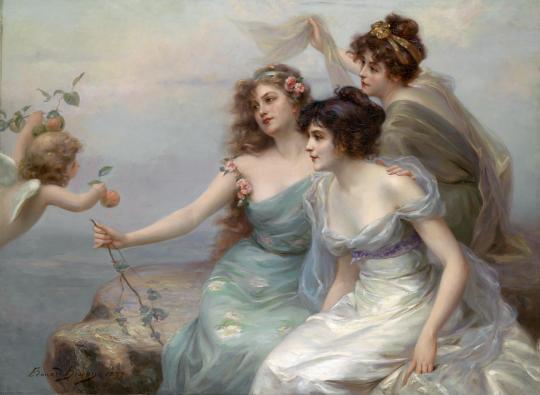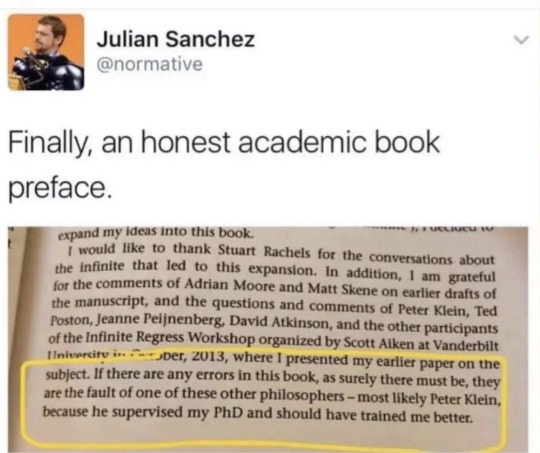#marsilio Ficino
Explore tagged Tumblr posts
Text
Di questi tempi, in un certo senso, non so che cosa voglio; forse non voglio quel che so e voglio quel che non so.
-Marsilio Ficino-
25 notes
·
View notes
Text
Di questi tempi, in un certo senso, non so che cosa voglio; forse non voglio quel che so e voglio quel che non so.
Marsilio Ficino
29 notes
·
View notes
Text
“Dreams are the speech of the soul; listen closely and you will hear yourself speaking truths you dare not say aloud.”
— Marsilio Ficino, The Book of Life
9 notes
·
View notes
Text
@centaurianthropology and @wigwamcore !!!! NEWS NEWS
BERNARDO BEMBO AND MARSILIO FICINO SHARED A BIRTHDAY
they were both born October 19 1433!!!
we KNOW that Marsilio would have learned that and been like "see the heavens have Made It Clear that we are meant to be Best Friends Forever"
(I'm pulling together my research cards for the lacuno letter project and just made this connection)
10 notes
·
View notes
Text
Italian literature tournament idea?
I have many things to do but still I want to fill the void of my existence, so a week ago I thought "why don't create a tumblr tournament between the authors from italian literature?".
For the names there are two simple option:
or I will chose the names from the literary canon
or I will open a google form when everyone, by a specified date, will insert the author names that will be put in the tounament.
both the three options combined: I will but the names already chosen under this post and after that open a google form if anyone else want to add some names. The more the merrier the longer = more violence between our favourite author from high school <3
The combination for the various challenges will be sorted randomly, I think I'll use a program/generator to do the job.
Idk if somebody else did the same thing for other literature, like the french or russian, but this idea could be used for various possibilities.
+ I think I'll add also playwrites, for me theatre and literature are different fields but a playwriter at the end of the road is still an author.
I also wanted to do the same thing for italian art, but is a field too wide and maybe in a future I could do it more by art schools/genres (best baroque artist/architect, best renaissance artist/architect etc).
#italian literature#italian history#tumblrita#dante alighieri#giacomo leopardi#giovanni boccaccio#divine comedy#luigi pirandello#italian theatre#tag a caso lessgoooo#angelo poliziano#marsilio ficino#elena ferrante#langblr
49 notes
·
View notes
Text
Have to admit, I don't often have actors in mind to portray historical figures I find fascinating, but my brain has 100% cast Michael Emerson as Marsilio Ficino. Just the description of him having huge eyes, and a sort of startled-owl face?

This is the face my brain supplies.
#marsilio ficino#michael emerson#neoplatonic gays#the face my brain has supplied for him#and I am totally cool with that
8 notes
·
View notes
Text
I've read a lot about Marsilio Ficino, but weirdly, I hadn't read any of his actual writings until this week.
...I knew enough to expect that Ficinian theology would be Extremely Wizardly, but I honestly did not expect it to be Extremely Gay. More fool me, I suppose.
5 notes
·
View notes
Text
instagram
Love as Divine Madness: Eros, Psyche & the Anima Mundi
“Love is the desire of the soul to return to its divine origin.” – Marsilio Ficino
Love is not possession.
It is not stillness.
It does not rest in the hands that try to hold it.
It erupts, collides, spirals—like the orbits of Venus and Mars.
Near, yet never at peace.
It is exile. It is return. It is fate.
Venus & Mars: The Eternal Lovers
Venus pulls—a force, unseen, magnetic.
Mars pursues—a blade, a spark, a hunger.
They do not belong to each other,
but they cannot escape each other.
Right now, Venus is exiled in Aries—love as war.
Mars lingers in retrograde in Cancer—desire drowning in nostalgia.
The lovers burn for each other, but they are not where they belong.
Eros & Psyche: Love as Trial & Transformation
Psyche is breath, butterfly, metamorphosis.
Cast into trials, exiled from certainty, sent to the underworld.
Eros is a shadow, an unseen touch.
To love Psyche, he must surrender to fate.
To a love that exists in blindness, in faith.
And still, love remembers.
Because love is not just longing.
It is recognition.
A force written in the stars before time.
The Astrology of the Unseen Thread
In the shadows, something sweet lingers—
The Moon touches Venus by antiscion.
A hidden tether. A love outside of time.
A pull beyond logic.
The heart senses what the mind cannot name.
With Mercury in Pisces, love speaks in riddles:
• Not through words, but through symbols.
• Not through certainty, but through surrender.
• Not through logic, but through divine madness.
Love is an Astrological Event
A Venus-Mars cycle.
A conjunction that ignites. A retrograde that unravels.
A return that rewrites.
It is the fall and the flight.
The abyss and the awakening.
The kiss and the wound.
And just when it seems to vanish—
it lingers.
#astrology #erosandpsyche #mythology #venus #astromagic #love #animamundi #hautecouture #marsilioficino #esoteric #occultwisdom #mystic #esoteric #celestial #archetypes #art #irisvanherpen #psycheanderos #lore #plato #alchemy #planetarymagic
#astrology#animamundi#Eros and psyche#love#occult#iris van herpen#Astro magic#magic#mythology#Plato#marsilio ficino#neoplatonism#Venus#mars#Mercury in Pisces#Venusinaries#mystic#poetic#fashion#couture#love story#metamorphosis#hermetism#gnosis#cosmos#ancient wisdom#Instagram
2 notes
·
View notes
Text
I bought a tiny little New Agey xylophone the other day at a gem show and wasn't entirely sure what to do with it except some vague idea that I would use it in yoga somehow. Then on a whim today I decided to read some Marsilio Ficino, some wires crossed in my head, and I just got back inside from playing some ethereal music to Venus as she was setting. And like...I genuinely feel so much better than before I did that. So that's pretty neat, and I'm gonna try to make that part of my daily practice from now on.
Also it's interesting how Ficino (and I assume he got this model from Plotinus or someone but I know Latin better than Greek so I'm not sure what the original term was) called the intermediary between soul and body /spiritus/, which yes means spirit but also means breath, just like how in yoga breath is the intermediary between mind and body. Not gonna go full prisca theologia with that right now but it sure is cool.
Also music is the breath of the earth (because we are part of the earth) singing.
5 notes
·
View notes
Text
I kinda don't give much of a shit about Marsilio Ficino but at the same time seeing his table of planetary correspondences makes me think that maybe he did end up preserving some pagan magic. But the thing is he was trying to convince everyone that it was Christian. Remember, Ficino was not a pagan, not even a Christopagan. He was a Catholic humanist, and back then being a humanist just meant you studied the humanities, which was basically the study of ancient Latin and Greek texts, which happened to be written by pagans. The Christian church at the time really didn't like the thought of people studying pre-Christian mythology, literature, philosophy, science, art, and especially not magic. So Ficino had to defend these interests from church censure, and he did this through Christian perennialism.
2 notes
·
View notes
Text
Joseph Campbell, THE MYSTERY NUMBER OF THE GODDESS

The Indian (Sānkhya) philosophers recognized as arising three “qualities or characteristics” (guṇas), through the interrelation of which all of “nature” (prakṛti) was seen as motivated; namely, “inertia, mass, or heaviness” (tamas); “energy and vitality” (rajas); and the “harmony or clarity” (sattva) of any balanced relationship of the opposed two. In Pythagorean terms, the same three would correspond, respectively, to (1) the “unlimited,” (2) the “limiting,” and (3) the “harmony” or “fitting together” (harmonia) of any “beautiful order of things” (kosmos), whether as a macrocosm (the universe), microcosm (an individual), or mesocosm (ideal society or work of art). And the number representative in that system of such a visible order is 4.

The Pythagorean tetraktys, viewed as an upward-pointing triangle built of 9 points with a tenth, as bindu, in the center, suggests an Indian tantric diagram (yantra) symbolic of the female power in its spiritually alluring role recognized by Goethe in the last two lines of his Faust: “Das Ewig-Weibliche/Zieht uns hinan!”

The trinity here is not of three male divinities with the Virgin then as a feminine fourth but of the classical three Graces with Apollo as a masculine fourth. Both the names and the postures of the Graces tell of the qualities of their influence: (1) Thalia (“Blooming, Abundance”) unites and relates her opposed companions; (2) Euphrosyne (“Mirth, Festivity, Good Cheer”) moves away from the God to the descent, ninefold, of the Muses; while (3) Aglaia (“Splendor, Beauty, Triumph, Adornment”) confronts him, returning to source. Pico and Ficino revered these three as an exemplary triad archetypal of all the others of classical myth. In Pico’s words, “He that understands profoundly and clearly how the unity of Venus is unfolded in the trinity of the Graces, and the unity of Necessity in the trinity of the Fates, and the unity of Saturn in the trinity of Jupiter, Neptune, and Pluto, knows the proper way of proceeding in Orphic theology.” For as Edgar Wind points out in commenting on this passage, “it was an axiom of Platonic theology that every god exerts his power in a traidic rhythm.”
#legend of zelda#zelda#twilight princess#goddesses#group of three#farore#nayru#pythagoras#gunas#neoplatonism#marsilio ficino#muses#nine muses#three graces#greek mythology#greek gods#apollo#joseph campbell#great goddess#hinduism#cosmos#harmony#sattva#goddess hylia#hylia#hylian
4 notes
·
View notes
Text

“But why do we think that love is a magician? Because the whole power of magic consists in love. The work of magic is the attraction of one thing by another because of a certain affinity of nature.”
― Marsilio Ficino De amore 6.10
[Sed cur magum putamus amorem? Quia tota vis magice in amore consistit. Magice opus est attractio rei unius ab alia ex quadam cognatione nature]
#Marsilio Ficino#Love is a Magician#The work of Magic#True Divine Love#De amore by Marsilio Ficino#Law of Attraction#Cosmic Law#Philosophy
4 notes
·
View notes
Text
Marsilio Ficino: El Platonismo y la Filosofía del Alma
Marsilio Ficino (1433-1499) fue una de las figuras intelectuales más influyentes del Renacimiento italiano. Filósofo, sacerdote y traductor, su labor fue crucial en la reintroducción del pensamiento platónico en la Europa de su tiempo. A través de sus traducciones y comentarios de Platón y los neoplatónicos, Ficino sentó las bases del humanismo renacentista y del pensamiento esotérico…
0 notes
Text

Ya Salaam
يا سلام
Ali said he fw my name during office hours today…. 😭😭
0 notes
Text

This is something I can see Pico Della Mirandola doing but it’s about Marsilio Ficino
#Marsilio blogging#pico Della mirandola#Marsilio Ficino#obviously mirandola attended university and trained with the best#but somehow I can just see him pulling some stupid stunt like this#and Marsilio stares into the camera like he’s on the office etc#renaissance Florence#everyone was a walking shitpost
59 notes
·
View notes
Text
Anima Mundi di Marsilio Ficino #12: Immortalità e resurrezione
“[…] non è sicuro accostarsi al compito della speculazione prima di aver attraversato il fuoco della purificazione morale, giacché qualcuno infetto dalle malattie dei vizi, potrebbe così ricorrere all’acume della speculazione per difendere ingiustizia ed empietà.” ‒ Marsilio Ficino Anima Mundi Marsilio Ficino #12 Immortalità e resurrezione Dodicesima puntata della rubrica “Anima Mundi” che…

View On WordPress
1 note
·
View note